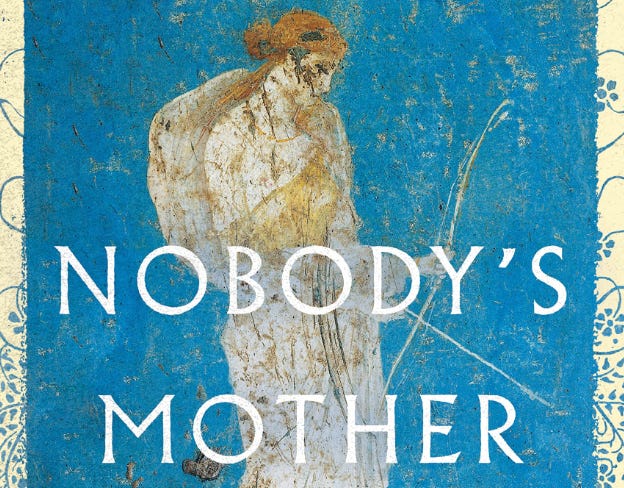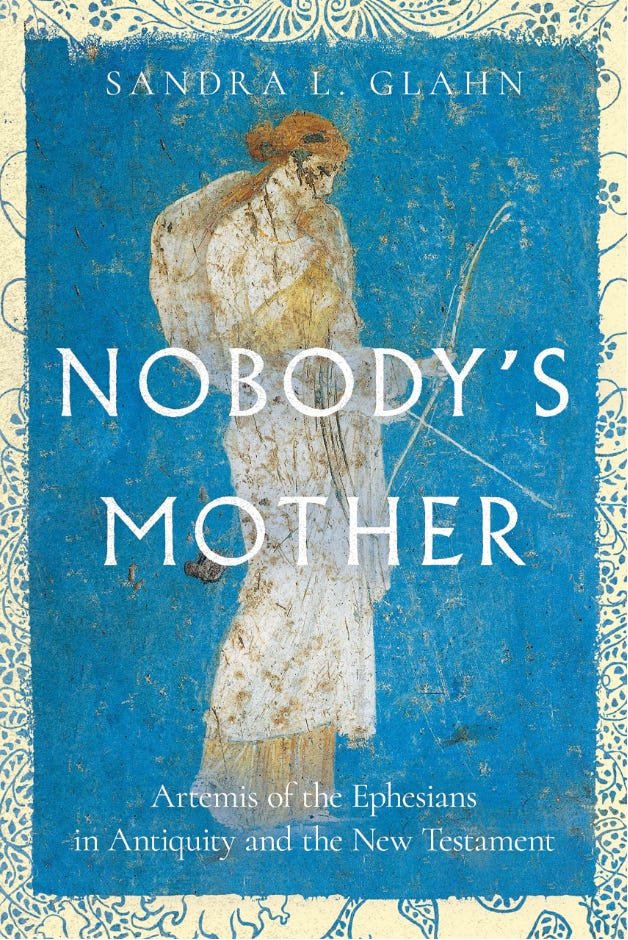Everyone’s theology – no exceptions here – comes into expression through one’s history, biography, and experiences. Mine does. Yours does. Sandra Glahn’s does. She writes, “Although I'm the fourth of five kids and grew up expecting to have a large family of my own, I have a body that has treated at least eight embryos as a disease. I have never given birth.” Eight. Eight. The experience of wanting to have children and not being able to conceive, has shaped Sandra Glahn as she tells us in her new book Nobody’s Mother. The subtitle is a dead giveaway: Artemis of the Ephesians in Antiquity and the New Testament.
Now if your past and your church context form you into believing that a woman’s role is in the home, making babies, and nurturing children and tending to her husband, what happens to the woman who cannot conceive? She asks, “So, what was I made for? The spiritual wound from my apparent deficiency struck at the core of my womanhood. Wasn't a woman designed to mentor and teach the next generation through mothering? How could I live as an incomplete person?”
That question asked by Sandra may be painful for some women reading this. We need to acknowledge this pain, to sit with you in your pain, and we want you to know that we — most of us in this Substack “room” — are for you and want you to flourish in what God has called you to do. Perhaps her story can be of help to you.
Sandra Glahn, as some of you know, has become a NT scholar, but that was through and after and during considerable struggles and years. The traditional role for a woman got some serious blows by her own reading of the Bible. Here is a longer quotation from her book:
Yet I saw that Paul encouraged some women to remain single (1 Cor 7:8). Were Mary and Martha deficient because they were unmarried (Lk 10:38-42)? Why, if marriage and parenting is the end-all, be-all for a Christian woman, is Priscilla (also called Prisca) mentioned apart from any children she might have had (Acts 18:2-3, 19, 26; Rom 16:3-5; 1 Cor 16:19; 2 Tim 4:19)? The merchant of the Thyatira purple company, Lydia -- did she even have a husband (Acts 16:14-15, 40)? Kids? Nympha, another house church leader (Col 4:15) -- what about her? Where would she fit in an anthropology that equates biology with building the Kingdom? And why in the world would Jesus have answered the woman who pronounced, “Blessed is the womb that bore you and the breasts at which you nursed!,” with, “Blessed rather are those who hear the word of God and obey it!” (Lk 11:27-28). The virgins and widows who came after them – like Thecla, Felicitas, Agnes, Catherine of Alexandria, Catherine of Siena, Praxedes, and Pudentiana? What about them? Where did nuns come from if biological motherhood was God's ideal?”
Yet, she was formed into the Christian faith in a view that was shaped by the role stated above. Quoting Köstenberger and Schreiner, “When Paul says that a woman will be saved by childbearing, he means, therefore, that they will be saved by adhering to their ordained role.” Oy. That is, these two well-known complementarian scholars believe “childbearing” in 1 Tim 2 is a synecdoche for the role of women in the home, having babies and nurturing them. Talk about a grid.
We are now back to the same problem and the same question: what is the purpose of a woman if she cannot conceive? That was the question Sandra was shaped by as she was formed into an excellent New Testament scholar.
She responds to what some have been and will be tossing into the eyes of those who read Sandra’s excellent new book: “I realized that I take a risk in sharing my journey at the beginning. The reader may say, “Your experience has led you to see the text a certain way.” To which I would answer, “Of course. As has yours!” And I would say “And yours and yours and yours” to the tune of that goodnight song in The Sound of Music. She, not Julie Andrews, writes, “Everyone looks at the text through the grid of personal experience.” Everyone.
Whether she is single or married, divorced or widowed, with or without biological or adopted children, a woman has the same highest calling as every other human: to glorify God and multiply worshipers -- that is, to do the will of God (Mt 28:19-20). This is what she was made for. This is a biblical anthropology. And this is the grid through which our interpretation will begin.
Join us for this new series on this about-to-appear book of Sandra Glahn’s.






just reading what you shared from her book wow absolutely wow . I always felt the church needed to shift away from barefoot pregnant and in the kitchen thinking about women. Thanks Scott for sharing excepts from her book
Eight. Eight. A crucible that necessarily must include 1,2,3,4,5,6,7 and finally 8 miscarriages. Each one heartbreaking, soul devastating, faith defining. This sister has the credibility to teach the truth that is the Word of God. May she be heard. Really heard.